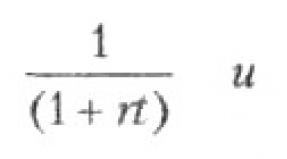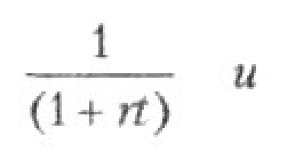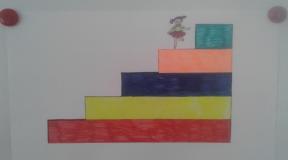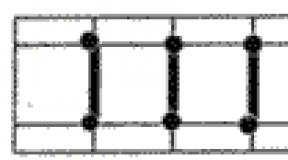Federal State Budgetary Institution “National Medical Research Center for Psychiatry and Neurology named after V. Bekhterev. National Medical Research Center for Psychiatry and Neurology named after V.M. Bekhterev Institute
The Bekhterev Institute is a medical institution that has been engaged in clinical practice for many years and this state institution specializes in the field of psychotherapy, neurology, psychiatry, narcology, psychodiagnostics, gerontopsychiatry and neurosurgery. The staff of this medical institution consists mainly of highly qualified specialists - and doctors.
History of the Institute's creation
Psychoneurological Institute named after. Bekhterev was created by an academician, an outstanding Russian psychiatrist, the founder of the pathopsychological direction and reflexology in Russia - Vladimir Mikhailovich Bekhterev. It was he who organized it in 1907 as a research and higher education institution. For many years, the Bekhterev Institute was the only institution in Russia that successfully combined clinical and pedagogical activities. Vladimir Mikhailovich rightly believed that for the future practical and scientific work of absolutely any doctor it is necessary to receive not only medical, but also legal and philosophical education.
The first stage in the life of the Institute

In 1911, the Bekhterev Institute in St. Petersburg, for the first time in Russian medical practice, organized and conducted so-called refresher courses for specialists in the field of neuropathology and psychiatry. Lectures on the latest discoveries and advances affecting these industries were given by leading clinicians over a full six weeks. Twenty-five doctors received appropriate training at these first advanced training courses in the history of Russian medicine. In addition, training programs of this type have been prepared for doctors of other specialties. Unfortunately, the war that began in 1914 did not allow Vladimir Mikhailovich to implement this project.
The second stage in the life of the Institute
In 1919, the Bekhterev Institute was reorganized. The presented educational faculties, in accordance with the relevant order, were transformed into such higher educational institutions as, for example, the St. Petersburg Chemical-Pharmaceutical Academy, and became the base of several. It was the Bekhterev Institute in the former USSR that became the first institution whose activities were aimed at the development of psychotherapy and revival of clinical psychology in Russia. Since 1993, this medical institution has been the basis of the World Health Organization in the field of scientific research, training of professional personnel and organization of psychoneurological care. In 2001, as a tribute to historical tradition, the Training Center was recreated at the Institute, which today carries out the educational activities of the Institute and is the leading one in the country.

Natalya Bekhtereva and the Brain Institute
Speaking about Vladimir Mikhailovich Bekhterev and his main brainchild, it is impossible not to mention Natalya Petrovna Bekhtereva, the granddaughter of a famous academician. She followed in his footsteps and graduated from Leningrad in 1947. Natalya Petrovna was very interested in the works of Bekhterev and subsequently wrote more than one book herself. In 1992, she was appointed head of the scientific group of neurophysiology of consciousness, creativity and thinking at the Institute of the Human Brain of the Russian Academy of Sciences, the latter, by the way, at that time was called the Bekhtereva Institute. In addition, Natalya Petrovna worked for a long time at the Research University of Experimental Medicine. If we talk about the main contribution that the granddaughter of a famous academician left in the field of medicine, then this is a scientific school in the field of physiology of the human brain. It was Natalya Bekhtereva who created it in her time. The Brain Institute, the place of her last work, helped in many ways and allowed her to lay the foundations for future fundamental research.
Bekhterev Institute today

Currently, the Training Center provides training in five main specialties. These are neurology, psychiatry, psychotherapy, clinical psychology and psychiatry-narcology. At the same time, all the necessary conditions have been created for future specialists to receive continuous professional education through the simultaneous implementation of basic and various additional educational programs. Also, everyone is given the opportunity to master several at once. In addition, training is available according to an individual program. The Institute provides students with the opportunity to participate in work and attend various regional and international scientific and practical conferences, schools and seminars.
Professional programs of the Institute
The main professional educational programs implemented by the Institute today are postgraduate studies, residency and internship. In addition, the administration of this institution plans to launch a master’s program soon.

Additional professional programs include programs of thematic improvement, advanced training and professional retraining. Persons who are just receiving or already have are allowed to master all of them. In addition, absolutely all programs combine clinical and theoretical training, training in supervision and special skills.
Features of education
If we talk about the features of training at the Bekhterev Institute, then first of all it should be said that here, during the training of specialists, very much attention is paid to educational work. The latter is aimed at expanding erudition, at developing a high spiritual level, commitment to the traditions of a given professional institution, as well as at introducing national cultural values. For graduate students, residents and interns, special lecture programs are provided at the Institute’s museum, as well as mandatory attendance at an excursion seminar within the walls of the Russian Museum.

Upon completion of the training process, each student receives an official document approved by the Ministry of Health and the Ministry of Education. It should be especially noted that currently the educational activities of this Institute are carried out not only on a commercial, but also on a budgetary basis.
reference Information
This educational institution is located in house number three on Bekhterev Street. The institute (the address has not changed for a very long time) occupies a large three-story building. Today, the administration of a higher educational institution, a counseling department, a laboratory of psychodiagnostics and clinical psychology, a department of community psychiatry and child psychiatry, a physiotherapy department, and a unit dealing with geriatric psychiatry are located here. In addition, at this address there is a training center, a neurosis clinic, a diagnostic research center and much more.
National Medical Research Center for Psychiatry and Neurology named after V.M. Bekhterev is one of the largest research and clinical institutions in the North-West region. NMITSPN them. V.M. Bekhtereva accepts patients free of charge (under the compulsory medical insurance policy with a referral from a specialist at the place of residence) and for a fee (for cash payment).
Diagnostics
Functional diagnostics:
- electroencephalography (EEG) with in-depth computer analysis
- video EEG monitoring of night and day sleep
- micropolarization (transcranial, transspinal, solar, peripheral)
- transcranial magnetic stimulation
- rheoencephalography
- stabilometry.
Clinical diagnostic laboratory :
- general clinical studies research
- biochemical tests of blood and urine
- determination of coronary risk factors, diabetes mellitus
- drug monitoring of anticonvulsants
- hormonal studies
- immunodiagnostics
- determination of tumor markers.
X-ray department:
Ultrasound:
- duplex examination of neck vessels, arteries and veins
Branches
Department of Biological Therapy of Mental Patients:
- endogenous psychoses
Department of Geriatric Psychiatry (Elderly Psychiatry):
- depressive states
- schizophrenia
- Alzheimer's disease.
Department of Child Psychiatry:
- obsessive-compulsive disorders (obsessive-phobic, obsessive-compulsive and other disorders, including Tourette's syndrome)
- epilepsy and epileptiform syndromes
- schizophrenia, affective, organic and other psychoses
- childhood autism
- mental retardation
- behavioral disorders (leaving home, skipping school, etc.)
- states of pathological fantasy
- attention disorders (attention deficit hyperactivity disorder)
- school adjustment disorders
- other mental, behavioral and psychological problems.
Department for the treatment of patients with alcoholism:
- alcoholism
- addiction
- substance abuse
- tobacco addiction.
Department of Surgery of Nervous and Mental Diseases:
- injuries of the central nervous system (defects of the skull bones, post-traumatic epilepsy)
- temporal lobe epilepsy
- hydrocephalus of various origins
- obsessive-compulsive disorders
- complicated forms of osteochondrosis
- brain tumors with epileptic syndrome.
Clinic of neuroses and psychotherapy:
- fears
- neuroses
- depression
- anxiety
- insomnia
- headache
- personal problems
- family problems.
Department of Community Psychiatry:
- depression
- fears
- obsessions
- neurotic conditions
- communication difficulties
- eating disorders.
Department for the treatment of mental disorders in young people:
- reactive psychoses
- endogenous psychoses
- affective psychoses
- organic psychoses
- schizophrenia
- postpsychotic states
- mental underdevelopment
- psychopathy
- personality disorders
- anorexia nervosa
- paroxysmal states
- epilepsy
- epilepsy with mental disorders
- non-psychotic conditions due to organic damage to the central nervous system
- neuroses
- neurosis-like conditions
- diencephalic syndromes
- addictive behavior in children and adolescents
- various fears and obsessions.
Department of Therapy for Patients with Addictive Pathology
Department of Rehabilitation of Psychoneurological Patients
Department for the treatment of patients with epilepsy
Department of Integrative Pharmaco-Psychotherapy of Mental Disorders
Physiotherapeutic department
Historical reference
The research institute was founded in 1907 by decree of Nicholas II V.M. Bekhterev for the “study of the brain and its functions” with private donations. It was the first research and higher educational institution in Russia, organized for the scientific development of psychology, psychiatry, neurology and other disciplines studying the human psyche. In 1925, the institute received the name of its founder. During the war, an evacuation hospital was established at the institute. Since 1993, the research institute has been the center of the World Health Organization for scientific research and training in the field of mental health.
License: www.bekhterev.ru/ob_institute/litsenziya.php
Specialization:
Research institutes
Description:
Today, the V.M. Bekhterev Institute is a large research and clinical institution employing highly qualified specialists (doctors and candidates of science) in the following fields:
NEUROLOGY: treatment of vascular diseases of the brain, epilepsy in adults and children, organic brain lesions, etc.
PSYCHIATRY: treatment of depression, schizophrenia and other mental illnesses with modern medicines.
PSYCHOTHERAPY: treatment of neurotic, personality, including psychosomatic disorders, various forms of gaming and computer addiction, psychotherapy of psychosis. The institute employs professionally trained certified psychotherapists, including those who have undergone training in European countries.
NEUROSURGERY: surgical interventions on the brain and spinal cord, including stereotactic and open operations for epilepsy, drug-resistant mental illnesses, hyperkinesis, consequences of traumatic brain injuries, etc.
NARCOLOGY: The department provides assistance to patients with alcohol, drug, substance abuse and gambling addictions, their relatives, as well as patients with psychiatric problems suffering from various types of addiction.
GERONTOPSYCHIATRY: treatment of mental disorders in old age, paying special attention to the diagnosis and treatment of motor and speech disorders, post-stroke depression, memory disorders, thinking, and cognitive activity.
PSYCHODYAGNOSTICS: psychological diagnostics of cognitive functions, emotional-volitional sphere, personal characteristics in adults and children, family relationships, diagnostics in the field of professional selection and vocational guidance.
The Institute's staff provides consultations on family relationships, psychological aspects of teaching and raising children, as well as professional selection, career guidance and personnel selection.
Educational programs:
Programs of various levels of study are offered:
- postgraduate study, clinical residency, one-year internship ,
- residency (for clinical psychologists) is a special form of retraining for psychologists, which allows them to obtain the necessary knowledge and skills to work in various areas of healthcare. In the training system for clinical (medical) psychologists, much attention is paid to teaching modern methods of psychodiagnostics, psychological counseling, psychocorrection and psychotherapy; psychological support of the treatment process. Training is conducted on the basis of the clinical departments of the Institute named after. V. M. Bekhterev and leading medical institutions of St. Petersburg. Depending on the level of preliminary training, programs lasting 1 and 2 years are offered. The form of training is full-time and part-time.
- primary specializations,
- a wide range of advanced training programs (general and thematic improvement).
Postgraduate education
Treatment methods
The main principles of treating alcoholism:
individual approach to each patient suffering from alcoholism and other addictions;
a combination of detoxification, medication, rehabilitation, psychological and psychotherapeutic methods of treating alcohol addiction;
involvement of the patient’s relatives and friends in the treatment and rehabilitation process;
the use of modern rehabilitation measures that ensure high-quality social adaptation of the patient after completion of the active period of treatment;
the use of anti-relapse techniques that protect patients from exacerbation of addiction and the emergence of a painful desire to drink alcohol;
comprehensive support for the patient and his family by qualified specialists throughout the entire path of treatment and rehabilitation.
At the Bekhterev Institute, alcoholism treatment takes place in several stages, which differ from each other, but are in close interaction. It is important to organize an integrated approach focused on combating physical and psychological addiction to psychoactive substances, cleansing the patient’s body of alcohol and other toxic compounds, getting rid of concomitant psychological and mental disorders and preventing relapses.
Price list
Name of service
Price
explanation
Treatment of alcoholismfrom 16478 rub.
explanation
Breaking binge drinking in hospitalfrom 2000 rub./ per day
Detoxification, pharmacotherapy aimed at relieving pathological craving for alcohol, restorative therapy of affected organs.
explanation
Psychotherapyfrom 2000 rub./ per visit
Esperal, sewing in, torpedo
from 3590 rub./ per procedure
Consultation with a psychiatrist-narcologist
from 2000 rub.
Accommodation
Team of specialists
Treatment methods
Price list
Name of service
Price
explanation
Detoxification in hospitalfrom RUB 28,796/ per day
explanation
Psychotherapyfrom 2000 rub./ per visit
Initial consultation with a psychiatrist-narcologist
explanation
Consultation with relativesfrom 1250 rub./ per visit
no patients
explanation
Introduction of the drug "VIVITROL"from 900 rub./ for service
opioid receptor antagonist
Accommodation
Team of specialists
Treatment methods
Stages and methods of treatment:
1.Diagnostics:
Social functioning;
General somatic condition;
An assessment is being carried out:
2. Therapy .
Applicable:
3.Psychological assistance.
Team of specialists
Treatment methods
Principles of detoxification in the treatment of drug addiction
The main principle of detoxification for drug addiction is an integrated approach to solving the problem. Each patient is individual, and you cannot begin detoxification measures without a detailed comprehensive examination of the body.
Treatment of drug addiction requires a complete cessation of drug use, which is accompanied by withdrawal symptoms. Patients experience extremely pronounced pain in the muscles, joints, bones, persistent insomnia, headaches, abdominal pain, diarrhea, nausea - and all these symptoms are accompanied by a feeling of fear and despair. The addict is driven by the desire to find a way to buy the drug and drown out his suffering at any cost.
The detoxification process takes up to 8-10 days, and specialists use various drugs and techniques to help survive drug withdrawal, including powerful analgesics, sleeping pills, drugs that eliminate cravings for drugs, as well as drugs that support and restore the functioning of cells throughout the body. body, primarily the liver, heart muscle, kidneys, and nervous system. Multivitamins and restorative medications are also prescribed. It is important to take a comprehensive approach to the detoxification process, because the outcome of all drug treatment depends on the quality of the procedures used.
Techniques for providing rehabilitation assistance to drug addicts
At our institute, all patients go through several important stages, thanks to which the rehabilitation of drug addicts gives a long-term (often lifelong) positive result. The following points can be highlighted in drug addiction treatment tactics:
active therapy begins only after the preparatory stage: experienced psychotherapists work with patients, who set the patient up for a long period of addiction treatment, allowing him to understand the full value of a normal life, without pathological addictions;
Rehabilitation and drug treatment assistance is based on an individually selected program that affects absolutely all areas of the patient’s life, changes his worldview, allows him to return to society as a protected and absolutely full-fledged person, confident that there will be no more drugs in his life;
active socialization and anti-relapse therapy prevent the development of relapses, and high-quality medical care restores disrupted processes in the patient’s body.
Price list
Name of service
Price
explanation
Detoxification in hospitalfrom RUB 28,796/ per day
explanation
Psychotherapyfrom 2000 rub./ per visit
Initial consultation with a psychiatrist-narcologist
Drug problems and addictive disorders;
Mental state. A psychological and clinical-psychopathological examination is performed: basic mental functions, emotional state, personality traits, neurocognitive functioning, etc. are assessed.
Instrumental and x-ray research methods are used;
Laboratory studies of biological material are carried out;
2. Therapy .
Applicable:
- Drug therapy is aimed at relieving psychopathological disorders, correcting behavior, normalizing sleep, suppressing pathological cravings, preventing breakdowns, and stabilizing remission.
- Modern pharmacological, highly effective agents with a proven mechanism of action are used;
- Motivational counseling - aimed at developing patient motivation to participate in diagnostic, treatment and rehabilitation programs;
- Psychotherapy (cognitive-behavioral) is a set of psychotherapeutic measures aimed at correcting erroneous thoughts, beliefs and negative experiences in order to change maladaptive forms of behavior;
- Combined treatment - a combination of various methods of therapy (pharmacological, psychotherapeutic) is used to increase the effectiveness of treatment and rehabilitation measures.
3.Psychological assistance.
- The department provides psychological counseling on issues related to addiction problems. Counseling takes place on an outpatient basis. Both individuals with addiction and their family members can seek psychological help.
- It is possible to conduct consultations with relatives without the participation of the patient. Psychological assistance to relatives of patients with addictive disorders is aimed at correcting the current emotional state of the patient, working with experiences caused by manifestations of addiction/changed behavior of a family member with addiction, and improving the quality of life.
4. Rehabilitation (outpatient).
Rehabilitation is a long process of restoring the body after various types of addiction. Rehabilitation activities can be carried out either individually with the patient or with the inclusion of relatives and accompanying persons. Rehabilitation includes systemic medicinal, psychotherapeutic, psychological and social effects aimed at reducing the normalization of the psychosomatic state, mobilizing personal resources, improving social and professional adaptation, improving family relationships, and establishing a healthy lifestyle. The inclusion of family members in the rehabilitation process helps to increase the effectiveness of the measures taken and the duration of remission.



















